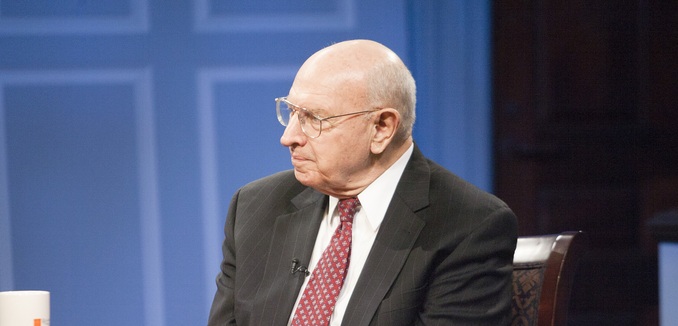A veteran U.S. diplomat who pushed for the nuclear deal with Iran, which allowed Boeing to sell $25 billion worth of planes to state-owned Iran Air, did not disclose that he was paid by Boeing during the time he advocated for the agreement, The Daily Beast reported Wednesday.
Thomas Pickering, a former ambassador to Russia, India, Israel, and the United Nations who served under Presidents George H.W. Bush and Bill Clinton, confirmed to The Daily Beast that he was an employee of the Boeing Corporation from 2001 to 2006, after which he continued his association with the company as a paid consultant until the end of 2015.
During the debate over the nuclear deal, Pickering testified before Congress, lobbied individual lawmakers, and published numerous articles promoting the deal. The Daily Beast could not find any records of him disclosing his ties to Boeing, a company that sought to benefit from the deal.
Neil Gordon, an investigator for the Project on Government Oversight, a watchdog group, told The Daily Beast that Pickering should have disclosed his ties to Boeing. “I think it’s necessary for the public debate,” he said. “It’s necessary for the public to fully realize the participants’ financial interests. Some of them might have a direct financial stake in a particular outcome.”
On June 16, 2014, Pickering testified before the House Armed Services Committee in favor of the nuclear deal and against imposing new sanctions on Iran. In the biography provided to the committee, Pickering only recounted his military and government service, not any business ties. He also co-authored an op-ed for The Washington Post in 2014 and an article for Tablet in 2015 advocating for the deal without disclosing his connection to Boeing. (In the latter article, Pickering dismissed concerns that Iran would use the funds it gained to sanctions relief to fund terrorist groups or the regime of Syrian dictator Bashar al-Assad. In fact, Iran has increased its defense budget by 90% since the implementation of the deal.)
An investigation by the Washington Free Beacon earlier this year revealed that Boeing had a team of 11 lobbyists to promote the deal. Boeing may have spent up to $4,956,000 on its broader lobbying efforts in the fourth quarter of 2015, according to its disclosure forms; one of the subjects it worked on was “U.S.-Iran Relations.”
Boeing’s decision to sell aircraft to Iran has been heavily criticized. Reps. Peter Roskam (R – Ill.) and Jeb Hensarling (R – Texas) sent a letter to Boeing CEO Dennis Muilenburg last week arguing that “American companies should not be complicit in weaponizing the Iranian Regime.” Emanuele Ottolenghi, a senior fellow at the Foundation for Defense of Democracies, warned that Iran’s history of using civilian aircraft for military purposes could make Boeing complicit in Iran’s support for Assad, including the regime’s war crimes. If the plane sales are determined to have aided the abuses of the Assad regime, the company could become subject to sanctions.
[Photo: Miller Center / Flickr ]




